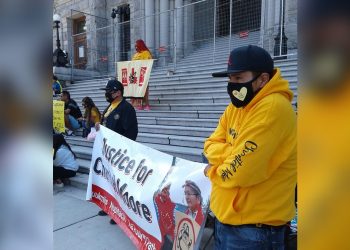A federal benefit for low-income people with disabilities will continue to provide no more than $200 per month — adjusted for inflation — but changes are planned to make the program more accessible and keep it from being clawed back in taxes.
Those are some of the key takeaways from the budget tabled on this week by the government of Prime Minister Mark Carney, according to anti-poverty campaigners.
NB Media Co-op volunteer Matthew Wright interviewed Janet Rodriguez, a community outreach coordinator with Disability Without Poverty:
Disability Without Poverty, a group that brings together advocates from across the country, has called for an increase in the new benefit, and efforts to reduce red tape that makes it hard for some people to access.
Service Canada began accepting applications for the benefit in June, and payments of up to $200 began in July. The program pays up to $2,400 in year, an amount that will be adjusted for inflation annually to reflect changes in the cost of living, according to the federal government.
In a 30-day month, that works out to just $6.66 daily. “We were also asking for a raise in the benefit because $200 a month is really not a lot,” said Janet Rodriguez, a community outreach coordinator for Disability Without Poverty.
But still, it’s a significant amount for many people struggling with poverty. “For many people, $6.66 a day could mean their food for the whole day,” she said. “It could be the ability to take transportation for a medical appointment or a social appointment — it is important to break the isolation in which a lot of people with disability live.”
The federal budget, which goes to a confidence vote Thursday evening, includes a one-time payment meant to make the benefit more accessible.
To receive the benefit, a person must already have been approved for the disability tax credit.
“When you have to apply for this disability tax credit, you have to go to your doctor’s or your clinician to fill out the form,” Rodriguez explained. In some cases medical professionals will charge upwards of $100 to sign, she said.
To offset those expenses, the budget sets aside $115.7 million over four years beginning in 2026-27, to provide “a one-time supplemental Canada Disability Benefit payment of $150 in respect to each Disability Tax Credit certification, or re-certification, giving rise to a Canada Disability Benefit.”
Disability Without Poverty welcomed the new supplement but said it doesn’t go far enough.
“This new one-time $150 payment is a welcome move toward administrative fairness — recognizing that red tape is a barrier in itself,” the group said in a Facebook post.
“However, it does not expand eligibility or remove the [disability tax credit] barrier that excludes many.”
Accessibility issues include the fact that many people don’t have a family doctor, and that some medical professionals are reluctant to sign documents attesting to a disability, Rodriguez said.
The budget also confirms that the federal government is planning legislation “to exempt the Canada Disability Benefit from being treated as income under the Income Tax Act,” another welcome measure for anti-poverty campaigners.
In this interview, Rodriguez discussed high rates of poverty among people with disabilities, the barriers they face accessing resources, and efforts to improve those conditions.
David Gordon Koch is a journalist with the NB Media Co-op and Matthew Wright is a volunteer with the Co-op. Both of them are based in Moncton. This reporting has been made possible in part by the Government of Canada, via the Local Journalism Initiative.


![Migrant workers’ labour conditions not on the table at Canada–U.S. lobster industry conference [video]](https://nbmediacoop.org/wp-content/uploads/2026/01/LobsterJan222026-5-350x250.jpg)


![Insurance industry association tapped former senior government official to lobby province against pharmacare [video]](https://nbmediacoop.org/wp-content/uploads/2026/01/david-trinks-mLaIFEtUZFs-unsplash-350x250.jpg)


![‘Anything but Conservative’ is preferred election outcome for many First Nations voters [video]](https://nbmediacoop.org/wp-content/uploads/2025/04/MTIMar312025-120x86.jpg)
